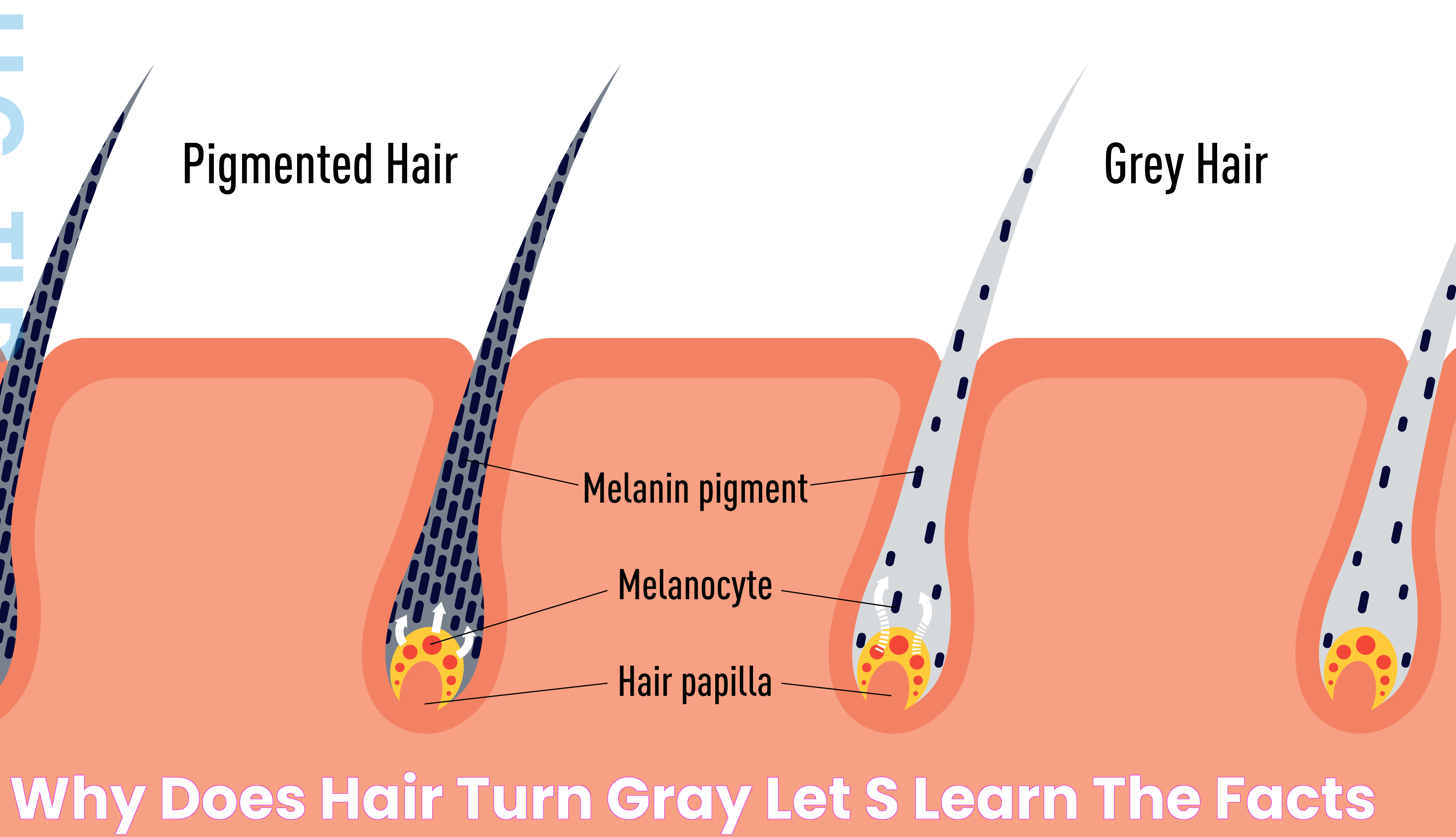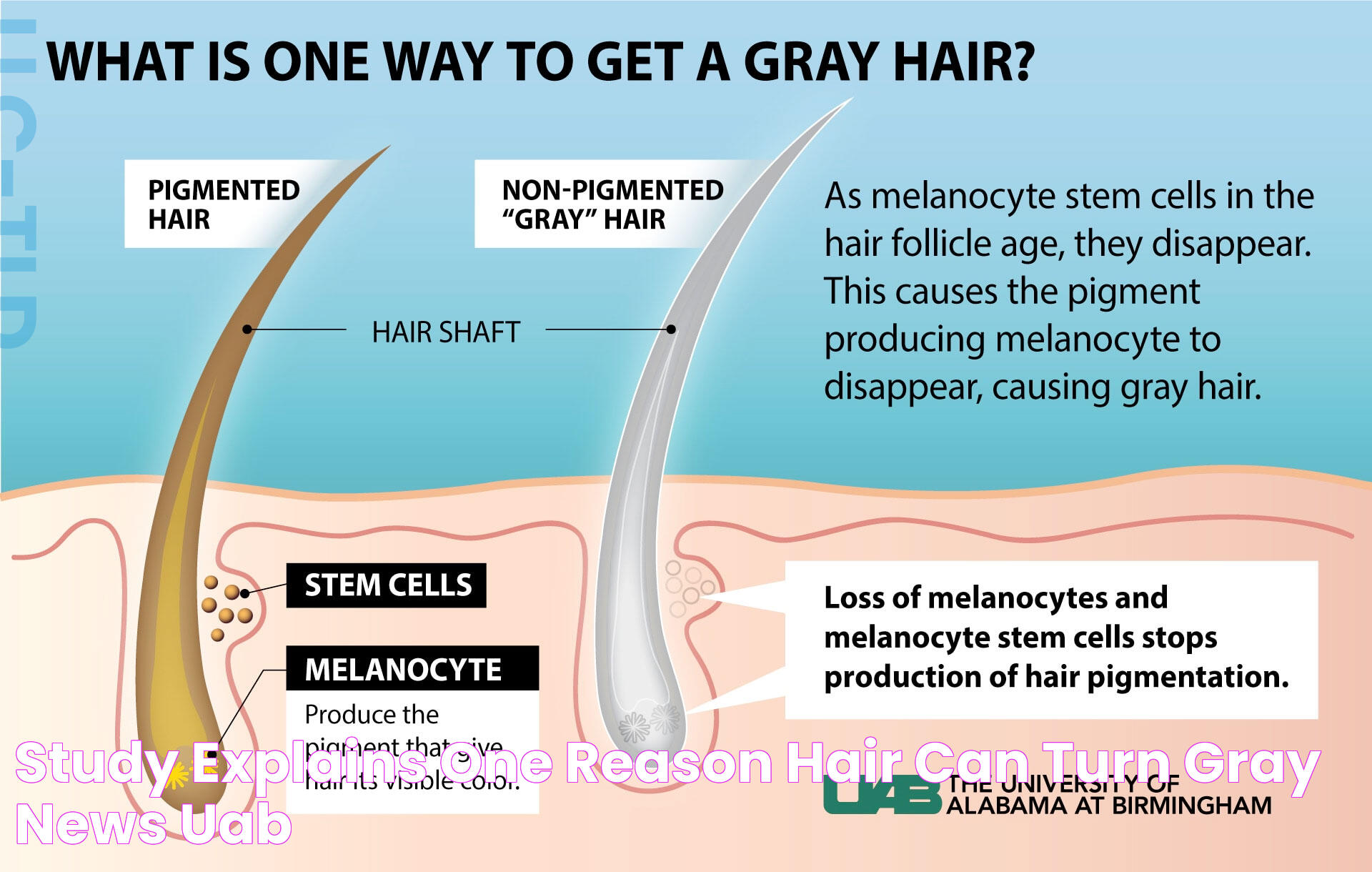Hair graying is a natural part of the aging process that many people experience as they grow older. However, for some, the appearance of those first grey strands can be alarming. It's a curious phenomenon that has piqued the interest of scientists and the general public alike. But why does hair turn grey, and what does it mean for our overall health? Understanding the science behind hair color changes can provide valuable insights into the complex processes at work within our bodies.
As we age, our hair follicles gradually produce less melanin, the pigment responsible for hair color. This reduction in melanin production leads to the loss of color in our hair, resulting in grey or white strands. While aging is the most common cause of hair graying, other factors such as genetics, stress, and lifestyle choices can also play significant roles. By delving into the intricacies of hair pigmentation, we can better appreciate the biological mechanisms that contribute to this seemingly inevitable change.
In this comprehensive article, we will explore the various reasons behind hair graying, including genetic influences, lifestyle factors, and potential health implications. We will also discuss preventive measures and treatment options available for those looking to maintain their natural hair color for as long as possible. By the end of this article, you'll have a thorough understanding of why hair turns grey and what you can do to manage or delay this process.
Read also:Royal Lives Meghan And Harrys Journey Beyond Tradition
Table of Contents
- Genetic Factors: The Role of Heredity in Hair Graying
- How Does Melanin Production Affect Hair Color?
- What Happens to Hair as We Age?
- Lifestyle Influences: Can Diet and Stress Cause Grey Hair?
- Are There Health Implications Associated with Grey Hair?
- Preventive Measures: Can We Stop Hair from Turning Grey?
- Treatment Options: How to Manage Grey Hair?
- Myths and Facts: Debunking Common Misconceptions
- The Psychological Impact of Graying Hair
- Celebrating Grey: Embracing Natural Aging
- Genetics vs. Lifestyle: What Has a Bigger Impact?
- Future Research: What Science is Exploring Next?
- FAQs About Hair Graying
- Conclusion: Embracing the Inevitable
Genetic Factors: The Role of Heredity in Hair Graying
Genetics play a significant role in determining when and how we experience hair graying. Our genetic makeup influences the age at which we start to notice grey hairs, as well as the overall pattern and speed of graying. Research has shown that certain genes are linked to the production and regulation of melanin, the pigment that gives hair its color. Variations in these genes can lead to differences in how early or late one might see the onset of grey hair.
Studies suggest that if your parents or grandparents experienced early graying, you might be more likely to follow in their footsteps. Understanding your genetic predisposition can help set realistic expectations about when you might start to notice grey hairs.
How Does Melanin Production Affect Hair Color?
Melanin is the pigment responsible for the color of our hair, skin, and eyes. Hair follicles contain cells called melanocytes, which produce melanin. The type and amount of melanin produced by these cells determine the color of our hair. There are two types of melanin: eumelanin, which gives hair black or brown hues, and pheomelanin, which results in red or blonde shades.
As we age, the activity of melanocytes decreases, leading to less melanin production. This reduction results in the gradual transition of hair color from its natural shade to grey or white. Factors such as genetics, hormonal changes, and environmental influences can affect melanin production and, consequently, hair color.
What Happens to Hair as We Age?
The aging process affects various aspects of our bodies, including our hair. As we grow older, several changes occur in our hair structure and growth patterns. Hair follicles may shrink, leading to thinner strands, and the rate of hair growth can slow down. Additionally, the natural production of oils by the scalp may decrease, causing hair to become drier and more brittle.
Graying is a common part of the aging process, and it's often one of the first visible signs. While some individuals may start to notice grey hairs in their 20s or 30s, others might not experience significant graying until their 40s or 50s. The timing of hair graying is largely influenced by genetics, but lifestyle factors can also play a role.
Read also:Pat Mcgrath Labs A Masterstroke In Beauty
Lifestyle Influences: Can Diet and Stress Cause Grey Hair?
While genetics are the primary determinant of hair graying, lifestyle factors can also contribute to the process. A balanced diet rich in essential nutrients is crucial for maintaining healthy hair. Deficiencies in vitamins and minerals, such as vitamin B12, vitamin D, and iron, can impact hair health and potentially accelerate graying.
Stress is another factor that can influence hair graying. Chronic stress can lead to the production of free radicals, which can damage melanocytes and reduce melanin production. Though stress alone is unlikely to be the sole cause of grey hair, it can hasten the process in individuals who are genetically predisposed.
Are There Health Implications Associated with Grey Hair?
For most people, hair graying is a natural part of aging and is not indicative of underlying health issues. However, in some cases, premature graying may be associated with certain medical conditions. For instance, autoimmune disorders like vitiligo and alopecia areata can impact melanocyte function and lead to premature hair graying.
Additionally, research has suggested potential links between premature graying and cardiovascular health. While more studies are needed to establish definitive connections, individuals experiencing early hair graying may benefit from regular health check-ups to monitor their overall well-being.
Preventive Measures: Can We Stop Hair from Turning Grey?
While it's impossible to completely prevent hair from turning grey, there are steps you can take to potentially delay the process. Maintaining a healthy lifestyle with a balanced diet, regular exercise, and stress management can support overall hair health. Ensuring you receive adequate nutrition, particularly vitamins and minerals that support hair pigmentation, can make a difference.
Additionally, protecting your hair from environmental damage, such as UV exposure and pollution, can help preserve its natural color. Hair care practices, like using gentle shampoos and conditioners, avoiding excessive heat styling, and minimizing harsh chemical treatments, can also contribute to maintaining healthy hair.
Treatment Options: How to Manage Grey Hair?
For those who prefer to cover or manage their grey hair, various treatment options are available. Hair dyes are the most common method for concealing grey strands. These dyes come in a range of colors and formulations, including permanent, semi-permanent, and temporary options. It's important to choose a product that suits your hair type and desired outcome.
Beyond traditional hair dyes, some natural remedies and supplements claim to restore hair color or slow down the graying process. While the effectiveness of these treatments varies, it's essential to approach them with realistic expectations. Consulting a dermatologist or trichologist can provide valuable guidance on the best options for your specific needs.
Myths and Facts: Debunking Common Misconceptions
There are many myths surrounding the graying process, some of which can create unnecessary worry. A common misconception is that plucking a grey hair will cause more to grow in its place. In reality, plucking a hair only affects the follicle from which it was removed, and it has no impact on neighboring follicles.
Another myth is that stress is the primary cause of grey hair. While stress can contribute to the process, it's not the sole factor. Genetics play a much larger role in determining when and how we experience hair graying.
The Psychological Impact of Graying Hair
For many individuals, the onset of grey hair can be a source of anxiety and self-consciousness. In a society that often equates youth with beauty, the appearance of grey hair can be perceived as a sign of aging. However, it's important to remember that graying is a natural and inevitable part of life.
Embracing grey hair can be empowering, and many people choose to celebrate their natural appearance. The growing trend of "going grey gracefully" encourages individuals to accept and appreciate their unique beauty, regardless of societal standards.
Celebrating Grey: Embracing Natural Aging
In recent years, there has been a shift towards embracing natural beauty, including the acceptance and celebration of grey hair. Many individuals are choosing to forego hair dyes and embrace their natural color, viewing it as a symbol of wisdom and experience.
Social media platforms and online communities have played a significant role in promoting the acceptance of grey hair. By sharing personal stories and experiences, individuals can find support and inspiration from others who have chosen to embrace their natural beauty.
Genetics vs. Lifestyle: What Has a Bigger Impact?
While both genetics and lifestyle factors influence the graying process, genetics is the primary determinant. The age at which you start to notice grey hair and the overall pattern of graying are largely dictated by your genetic makeup.
However, lifestyle factors, such as diet, stress, and hair care practices, can impact the rate and extent of graying. By adopting healthy habits and making informed choices, you can support your overall hair health and potentially delay the onset of grey hair.
Future Research: What Science is Exploring Next?
The study of hair graying is an ongoing field of research, with scientists exploring various aspects of the process. Future research may focus on identifying specific genes and pathways involved in melanin production and hair pigmentation. This knowledge could lead to the development of new treatments and interventions for managing grey hair.
Additionally, researchers are investigating the potential links between hair graying and other health conditions, such as cardiovascular disease and autoimmune disorders. Understanding these connections could provide valuable insights into the broader implications of hair graying on overall health.
FAQs About Hair Graying
1. Does stress cause grey hair?
While stress can contribute to the graying process, it's not the primary cause. Genetics play a more significant role in determining when and how we experience grey hair.
2. Can diet affect hair graying?
A balanced diet rich in essential nutrients can support overall hair health and potentially delay the onset of grey hair. Deficiencies in vitamins and minerals may impact hair pigmentation.
3. Is it possible to reverse grey hair?
Currently, there are no proven methods to reverse grey hair permanently. However, hair dyes and certain treatments can help manage or conceal grey strands.
4. Are there any health risks associated with grey hair?
For most people, hair graying is a natural part of aging and does not indicate underlying health issues. However, premature graying may be linked to certain medical conditions.
5. Can hair graying be prevented?
While it's impossible to completely prevent hair graying, maintaining a healthy lifestyle can potentially delay the process.
6. Why do some people go grey earlier than others?
The timing of hair graying is largely influenced by genetics. If your family has a history of early graying, you may be more likely to experience it at a younger age.
Conclusion: Embracing the Inevitable
The graying of hair is a natural and inevitable part of the aging process. While genetics play the most significant role in determining when and how we experience grey hair, lifestyle factors can also influence the process. By understanding the underlying causes of hair graying and adopting healthy habits, individuals can support their overall hair health and potentially delay the onset of grey hair.
Ultimately, embracing the natural changes that come with aging can be empowering. Whether you choose to celebrate your grey hair or explore treatment options, the decision is personal and should reflect your unique preferences and values. By appreciating the beauty and wisdom that come with age, we can approach the graying process with optimism and confidence.

